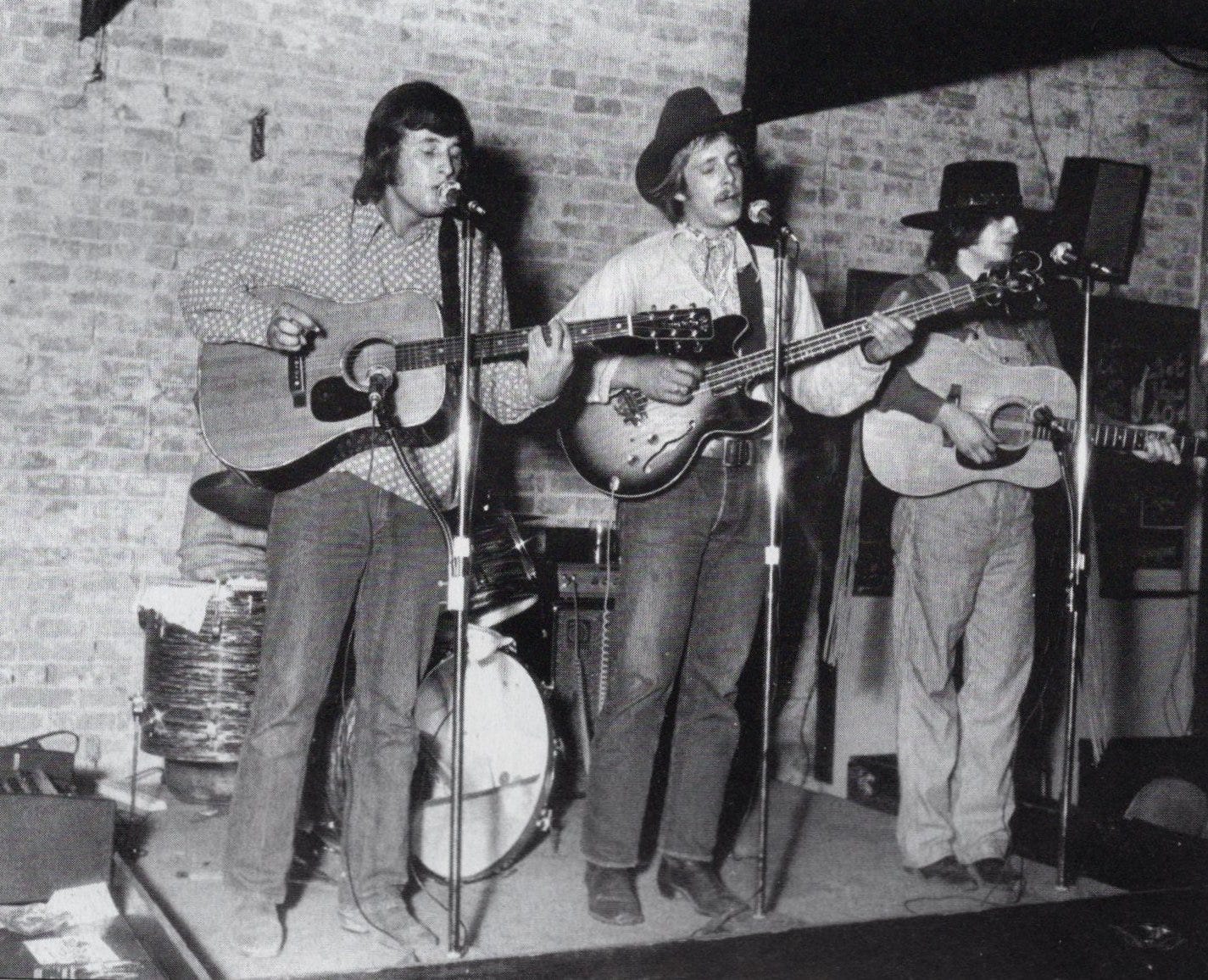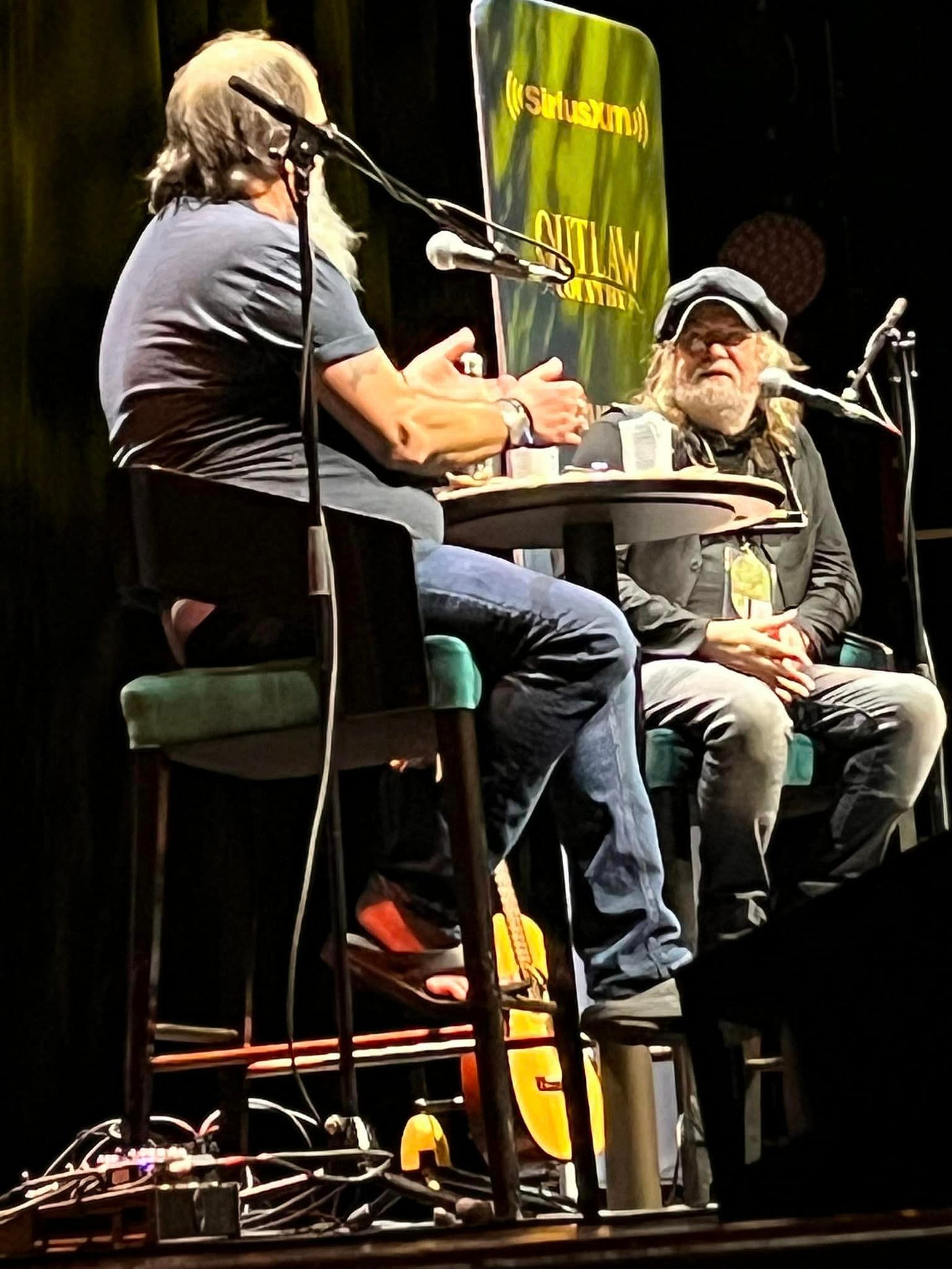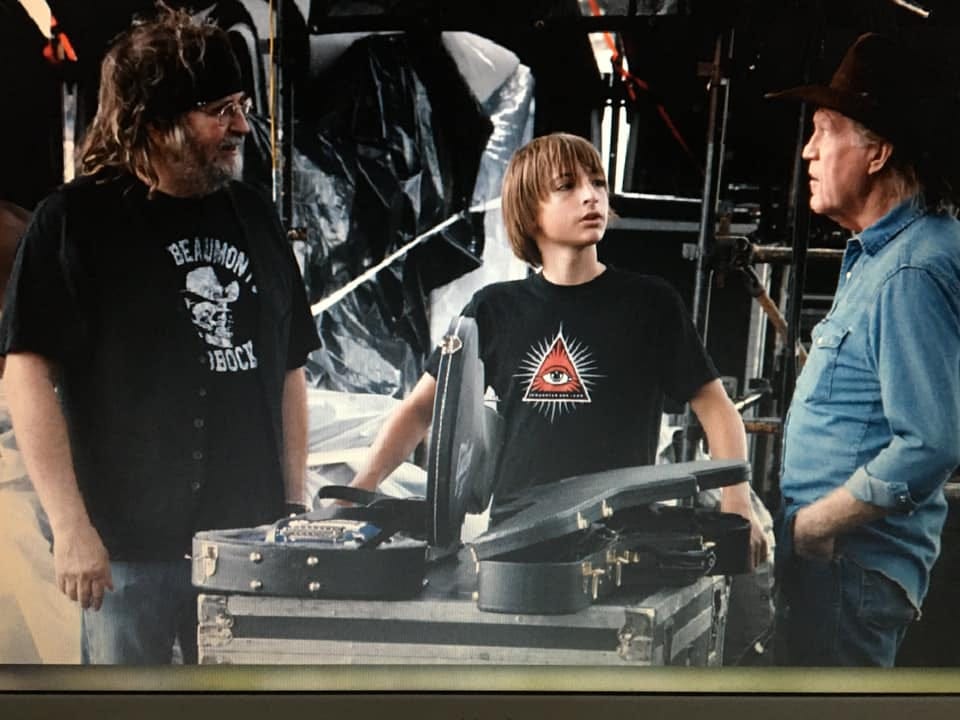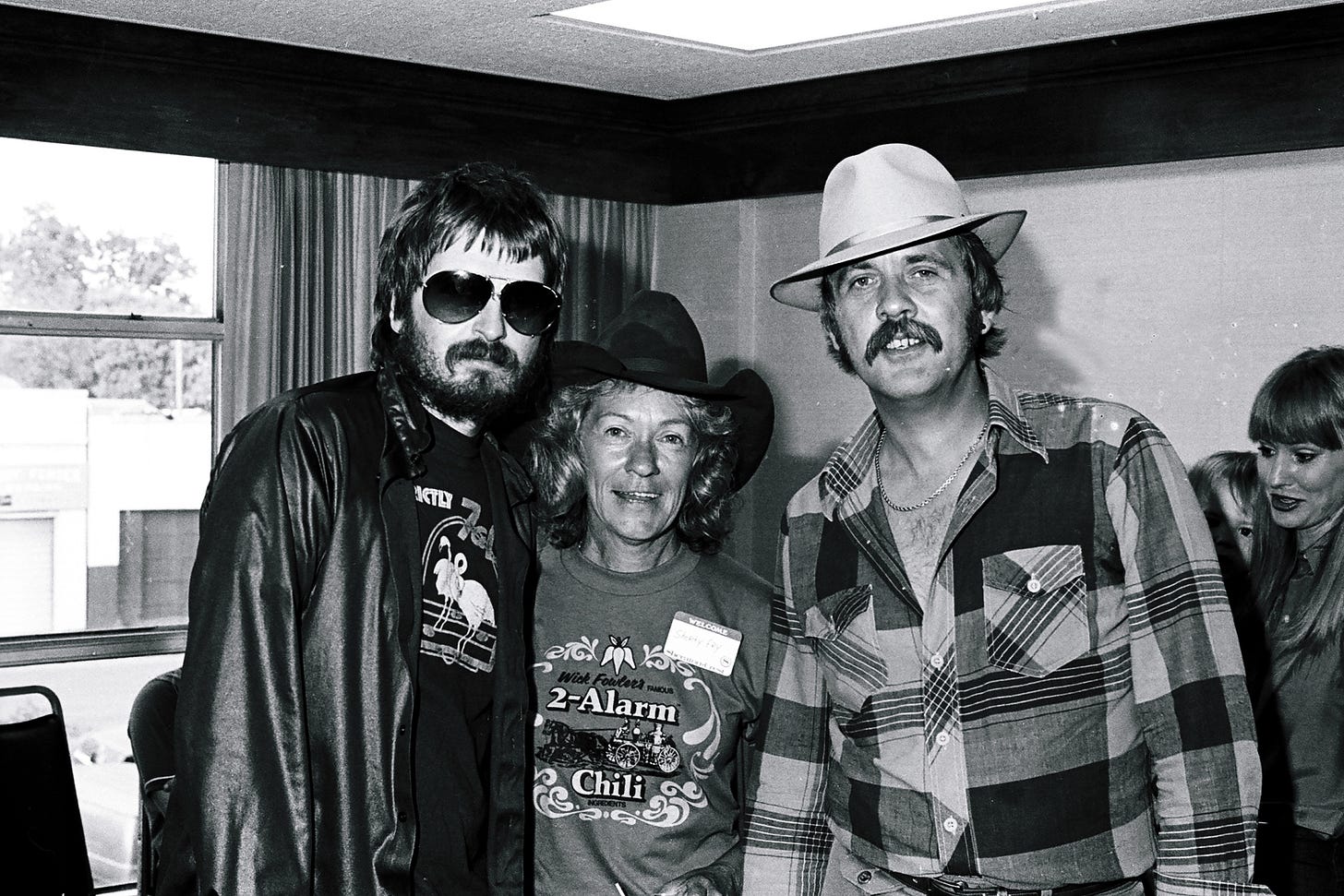Ray Wylie Hubbard from 'Redneck' to Rilke
The musical fixer-upper rebounds from the top of Mount Karma
One of the highlights of the Outlaw Country Cruise, for me, was the hourlong SiriusXM radio interview Steve Earle conducted with Ray Wylie Hubbard at the Stardust Theater. Ray is hilarious, deadpan, and Steve, who tends to talk more than most hosts, stayed out of his way. They talked a lot about Austin clubs of the ‘70s like the original Saxon Pub on the I-35 frontage road where Hubbard played with Three Faces West, which became Texas Fever when they added Bob Livingston during “the great progressive country scare” (Steve Fromholz). If you’ve seen Ray Wylie live, you know his talking is as entertaining as his singing. “This is a new song,” he said later that night at the Stardust. “I don’t have any banter for it yet.”
RW is all about that grit n’ groove, best exemplified by “Mother Blues,” the song he did on Letterman. It’s the story of him and wife Judy and son Lucas coming out of a sordid den in Dallas, to find their Mount Karma in Wimberley. I’ve heard it a hundred times and I still laugh out loud every time he interjects “down in Louisiana, where the alligators grow so mean.”
Here’s a story I wrote about the Hubbards circa 2001, when the comeback was in full stride. We met at Sweetish Hill for coffee. Lucas was about 10.
From Redneck to Rilke
“Are you afraid to go on?" a roadie asked Ray Wylie Hubbard, as the soft-spoken singer-songwriter waited in the wings and a crowd of 2,000 chanted the name of somebody else. "Pat Fucking Green! Pat Fucking Green!" they screamed. "The last guy who opened for us didn't even last two songs," the stagehand said. "They just drowned him out."
So here was a 54-year-old poet with an acoustic guitar, ready to sing haunting, blues-affected songs to an unruly crowd of college kids playing cowboy for the night. But he wasn't the least bit worried.
"Aren't you forgetting something?" Ray Wylie asked the roadie. "I'm the guy who wrote 'Up Against the Wall, Redneck Mother.' I'll play it every other song if I have to."
It didn't come to that. Ray Wylie had to play the quintessential beer-chuggin', hat-wavin', hell-raisin', Texas anthem only once (admittedly, the long version). Thanks to steady airplay on KGSR in recent years, Hubbard has a slew of other recognizable songs, such as "Three Days Straight" off his new album, Eternal and Lowdown. As he's cultivated more serious listeners with such heady releases as '99's Crusades of the Restless Knights and '97's Dangerous Spirits, both produced by Lloyd Maines, Ray Wylie has even managed to get through complete sets without anyone yelling out requests for the song he says he wished he'd never written (though he's quick to add that he's never sent back a royalty check). But it must be good to know that the old albatross, made famous by Jerry Jeff Walker on 1973’s landmark Viva Terlingua, fits in his back pocket.
The tune's famous spelling-out of "M-O-T-H-E-R" can also help us move through the life of a man who started over at age 41-- getting straight and relearning the guitar and how to be a husband.

"M" is for Mount Karma, which is what Ray Wylie and wife-manager Judy call their five acres on a hill overlooking Wimberley. When they went looking for a new place in 1998, Judy wanted a pool. Ray Wylie, meanwhile, pined for a log cabin in the country. Someone would have to lose, right? But when a realtor friend heard the couple's wish list, he said, "You're not going to believe this, but I know of a log house with a pool that's about to go on the market."
"It looked right out of The Munsters," Ray Wylie recalled. The pool was cracked and filled with muck; weeds had engulfed the logs in green and brown; and the interior, which had been uninhabited for five years, looked ransacked. "I got out of the car and said, 'I love it!' "
The musical "fixer upper," whose career was once in shambles, looked past the grit and grime and saw the possibilities. If there's anything the Hubbards have learned, it's that things can turn around. Their lives crossed as each was in the early stages of recovery from drugs and alcohol, so they know magic can come from a mess.
They met in early 1988, not in the basement of a church at noon, but in a nightclub after midnight. "I was touched by the words he was singing," Judy says of that set at Poor David's Pub in Dallas. When he opened his dressing room door, she was there, a stunning beauty. Their first date was a wrestling match at the Sportatorium, because a broke Ray Wylie could get in free, followed by a dinner of coldcuts backstage at Rusty Wier’s Longhorn Ballroom show. Nobody can call Judy Hubbard a gold-digger. She manages her husband's career with a nurturing style that has earned her the nickname "Mother Hubbard" from band members.
"O" is for oblivion, Ray Wylie's nightly destination until he finally realized his only choices were to go on the wagon or ride in the hearse. “I had burned all the bridges I slept under,” Hubbard said of his mid-’80s rock bottom. "I used to take comfort from the loneliness with whiskey/But it tore up my soul and turned against me" he sings on the new "Didn't Have a Prayer." It's a number from the dark end of the street about finding spirituality when you don't think you deserve it.
Ray Wylie had given up alcohol and cocaine only a week earlier and his resolve was starting to get shaky when Stevie Ray Vaughan spoke at a recovery meeting in Dallas in November '87. "I'd met him only once before, when we were both trashed, but he'd been sober about 14 months when I ran into him again, so he sat down with me and talked about some of the things he'd been going through. He told me that back when he was partying it felt like he was playing the guitar with gloves on, and getting sober was like taking off the gloves." Ray Wylie had worried that as a teetotaler he'd lose the fire to create, but in Vaughan he saw someone who had burned even more intensely after going straight. The next time he ran into Vaughan, he proudly told Stevie that he'd just made a year sober, and the pair hugged.
"T" is for Texas, always for Texas. But it can also be for Twinkies, officially Ray Wylie Hubbard and the Cowboy Twinkies, who practically invented “cowpunk” with their hard rock riffs tangling with the twang. Hubbard, longtime collaborator Terry Ware, guitarist Larry White, bassist Clovis Roblaine and drummer Jim Herbst were signed to Warner Brothers in 1975 on the basis of the crowd-flattening live show. But wanting to appeal to country radio, the label overdubbed female backup singers and steel guitar without the band’s knowledge or permission. When Hubbard got back the sweetened version on cassette, he excitedly popped it in his car. When his mother came home and saw Ray Wylie sobbing in the driveway, she asked what was wrong. “I just listened to our album.” Hubbard contacted a lawyer to see if there was anything he could do to prevent this abomination from being released. “I’d consider to start drinking,” was the advice, which Hubbard took like a redneck mutha. He released only one album in the ‘80s, Caught In the Act on his own label.
"H" is for the humility Ray Wylie showed when he realized that his songwriting wouldn't improve until he learned how to fingerpick. And so at age 43, this honky-tonk veteran, who had already achieved a measure of success as one of Waylon/Willie's "and the boys," took his first guitar lesson. "See, I was hearing these songs in my head, but I couldn't get my guitar to play 'em," he says. He was a carpenter with only a saw in his toolbox.
But even as his music improved, his following, especially in his hometown of Dallas, got smaller. Soon after recording the brilliant Loco Gringos Lament ('94) for San Marcos-based DejaDisc, Ray Wylie's first label since a couple of Nashville disasters in the late '70s, he and Judy decided to move to Austin. She quit her well-paying executive job at a Lincoln Mercury dealership and the couple, with baby Lucas in tow, moved to a tiny house in downtown Wimberley.
”E” is for ecstatic, which is how Ray Wylie felt when Mayor Kirk Watson called him up just six months after moving to the Austin area. “Bring your guitar to the City Council meeting tomorrow,” said Watson, declaring, “It's 'Ray Wylie Hubbard Day.” He had been almost invisible the previous ten years in Dallas.
"R" is for Rilke, the writer Rainer Maria Rilke, whose book Letters to a Young Poet had a profound effect on Hubbard during the midlife crisis intervention he'd done on himself. He even quotes Rilke at the end of "The Messenger," from Lowdown and Eternal. "Our fears are like dragons guarding our most precious treasures," he sing in his crisp folky voice. "Y'all should go out and pick up a copy of 'Letters to a Young Poet,' " he said at the song’s end. "You know, after you buy my CD." Ray Wylie's a witty guy whose first band to play Austin, Three Faces West, was called “the funniest group to ever play our stage” by Allen Damron of the Chequered Flag. A buzzed Hubbard once performed a 45-minute set at Kerrville Folk Festival without finishing a song and got a standing ovation anyway. Ray Wylie can really tell a story.
The knee-slapping humor and heart-tugging songs may seem strange stagefellows, but Ray Wylie said he always likes to put the unlikely together. "It's like the album title -- Eternal and Lowdown. They seem to have two completely different meanings, but something happens with those words when you put them together. When Gurf heard the demos, he said he wanted to make a record that was elegant and all messed up at the same time, and I went 'Yeah!' He got it."
Two other disparities that meld harmoniously are the log cabin and the swimming pool, which have been restored to near mint condition on that hill overlooking the town. "If you saw our place now you'd think we're richer than we are, but I'll tell ya, it was a LOT of work," Ray said. For the first six months, the family's kitchen consisted of an ice chest, a microwave and a card table. The living room was three folding chairs. Bed sheets hung where doors should've been.
But little by little, one day at a time, all the pieces of their paradise have been put together. His career, meanwhile, has fallen into place, too, with rave reviews and radio play bringing his music to his biggest audience, including superfan Ringo Starr, since the "outlaw country" days.
It's a long, bending, weight-shifting, gravel-grinding drive to get to the top of Mount Karma. But if it was easy, it wouldn't mean as much to get to where you finally belong.






